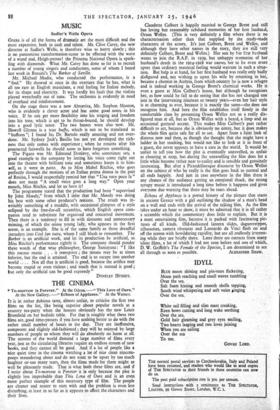MUSIC Sadler's Wells Opera
OPERA is of all the forms of dramatic art the most difficult and the most expensive, both in cash and talent. Mr. Clive Carey, the new director at Sadler's Wells, is therefore wise to hurry slowly ; this is no pantomime transformation-scene to be effected with the wave of a wand and, Heigh-presto! the Princess National Opera is spark- ling with diamonds. What Mr. Carey has done so far is to recruit a number of young singers and conductors, some of whom I heard last week in Rossini's The Barber of Seville.
Mr. Michael Mudie, who conducted the performance, is a "find." He showed at once in the overture that he has, what is all too rare in English musicians, a real feeling for Italian melody, for its shape and elasticity. It was hardly his fault that the violins played wretchedly out of tune. The orchestra is evidently in need of overhaul and reinforcement.
On the stage there was a new Almaviva, Mr. Stephen Manton, who is evidently a clever actor and has some good notes in his voice. If he can get more flexibility into his singing and freedom into his tone, which is apt to be throat-bound, he should develop into a good lyric tenor. The two basses were also new. Mr. Howell Glynne is a true bull°, which is not to be translated as "buffoon "; I found his Dr. Bartolo really amusing and not over- done. Mr. Sydney Jack's Basilio has not yet developed the rich- ness that only comes with experience ; when he returns after his protracted farewells he should seem to have forgotten something.
The Figaro was Mr. Edmund Donlevy, who sometimes sets a good example to the company by letting his voice come right out into the theatre with brilliant tone and sometimes keeps it to him- self, as it were in petto. As to Miss Mabel Ritchie, who goes perfectly through the motions of an Italian prima donna in the part of Rosina, I would respectfully remind her that "Una voce poco fa" does not mean "A small voice goes a long way." Open your mouth, Miss Ritchie, and let us have it!
The programme stated that the production had been "supervised by John Moody," from which I infer that Mr. Moody was doing his best with some other producer's notions. The result was in- evitably something of a muddle, with occasional glimpses of a style eclipsed by the free-for-all scrambles, which English opera com- panies tend to substitute for organised and concerted movement. Then there is a tendency to fill in with tiresome and unnecessary miming, of which the otiose young lady, who appears in the first scene, is an example. She is of the same family as those dreadful intruders into Cosi fan tulle, whom I still blush to remember. The Barber: is an artificial work, and let its production be artificial, as Miss Ritchie's performance rightly is. The company should ponder these words of that wise philosopher, George Santayana: "I like this rococo music . . . it transports ; the means may be at times Snferior, but the end is attained. The end is to escape into another world .... Not all that is artificial is good, because the artifice may become stupid or even vicious • and much that is natural is good ; but only the artificial can be good expressly"
DYNELEY HUSSE Y.






























 Previous page
Previous page